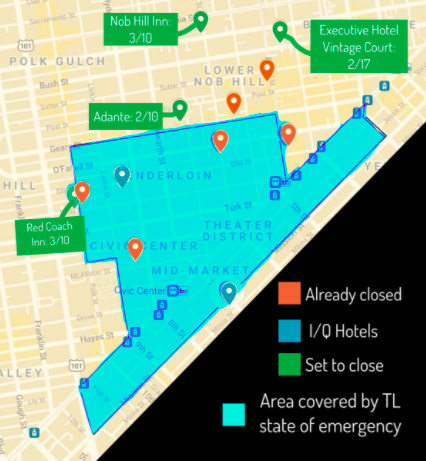As a state of emergency takes effect in the Tenderloin, the city has scheduled to close four more hotels sheltering unhoused people from the coronavirus pandemic in the next two months — even as the omicron variant surges in congregate shelters.
These shelter-in-place (SIP) hotels will shut down by the end of March. The SIPs—the Adante Hotel, Executive Hotel Vintage Court, Nob Hill Inn and Best Western Red Coach Inn—comprise almost 200 rooms among them spread within a 50-square-block area from the Tenderloin to Lower Nob Hill to Union Square.
The vicinity of the hotels also overlaps with the neighborhood police station’s jurisdiction where Mayor London Breed declared it as an emergency zone on December 17. Ostensibly, it was because of an increase of drug overdoses in the Tenderloin that Breed announced a state of emergency, but neighborhood advocates say the plan would ratchet policing against people experiencing homelessness and substance use disorder while services are sorely needed.

So far, the city has already shuttered nine of 30 SIP hotels that opened in 2020, even though it has been guaranteed funding from the Federal Emergency Management Agency to keep the hotels running through September.
A couple of SIPs won’t be put entirely out of commission. The city has been placing unhoused people in the Cova Hotel on Ellis Street, which ceased operating as a SIP hotel in December, as part of the mayor’s emergency intervention plan. The Department of Homelessness and Supportive Housing repurposed the Cova as a non-congregate shelter, which is expected to operate through March. Also, the 116-unit Good Hotel on Seventh Street has been converted from a SIP to an isolation and quarantine hotel for people who contract Covid.
But as for permanent housing, it’s not yet clear where the exiting SIP residents will go. According to the latest available HSH data, only 23% of SIP residents exited into permanent supportive housing, while 66% of them transferred to other hotels.
Also, the department has been falling short on its weekly and monthly placement goals: only about half have moved elsewhere, while fewer than 900 permanent supportive housing units are vacant. An HSH report to the Local Homeless Coordinating Board shows only 679 housing placements of adults, families and transitional-aged youth, or an average of 136 per month, since the 2022 fiscal year began last July.
In the meantime, two congregate shelters have seen COVID outbreaks: Multi-Service Center South saw 20 new cases, while the Division Circle navigation center reported at least 50 new infections in December and January. At the same time, citywide case rates and hospitalizations spiked with the emergence of the omicron variant, which is far more contagious than earlier strains.
City data show relatively low case numbers among unhoused San Franciscans throughout the pandemic, thanks in part to the privacy of SIP hotel rooms. Even when there were increases due to the delta and omicron variants, they mirrored those of the general population.
Yet while the coronavirus continues to thrive in close quarters, congregate shelters have been reopening and a new facility that could host up to four people to a room is close to beginning operation. Dolores Street Community Services is reopening its shelter of some 100 beds on South Van Ness Avenue, including Jazzie’s Place, a shelter catering to lesbian, gay, bisexual, and transgender members of the unhoused population. This month, the Bryant Street navigation center will also reopen across the street from MSC South.
The latest site accommodating unsheltered people could be the Ansonia Hotel, according to an HSH report to the Local Homeless Coordinating Board. The 123-room former hostel on 711 Post St. might start taking in safe sleep site residents at the Civic Center and Jones Street who haven’t been connected to housing yet, pending the Board of Supervisors’ approval of the contract. The site might act as a semi-congregate shelter because it offers community lounges, bathrooms and showers on each floor, community lounges, a commercial kitchen, and a dining space, according to media reports. HSH spokesperson Emily Cohen told the board’s Budget and Finance Committee that the Ansonia’s capacity is up to 250, with up to four to a room.
As of publication, almost 2,500 people have exited SIP hotels since the program began in April 2020.




